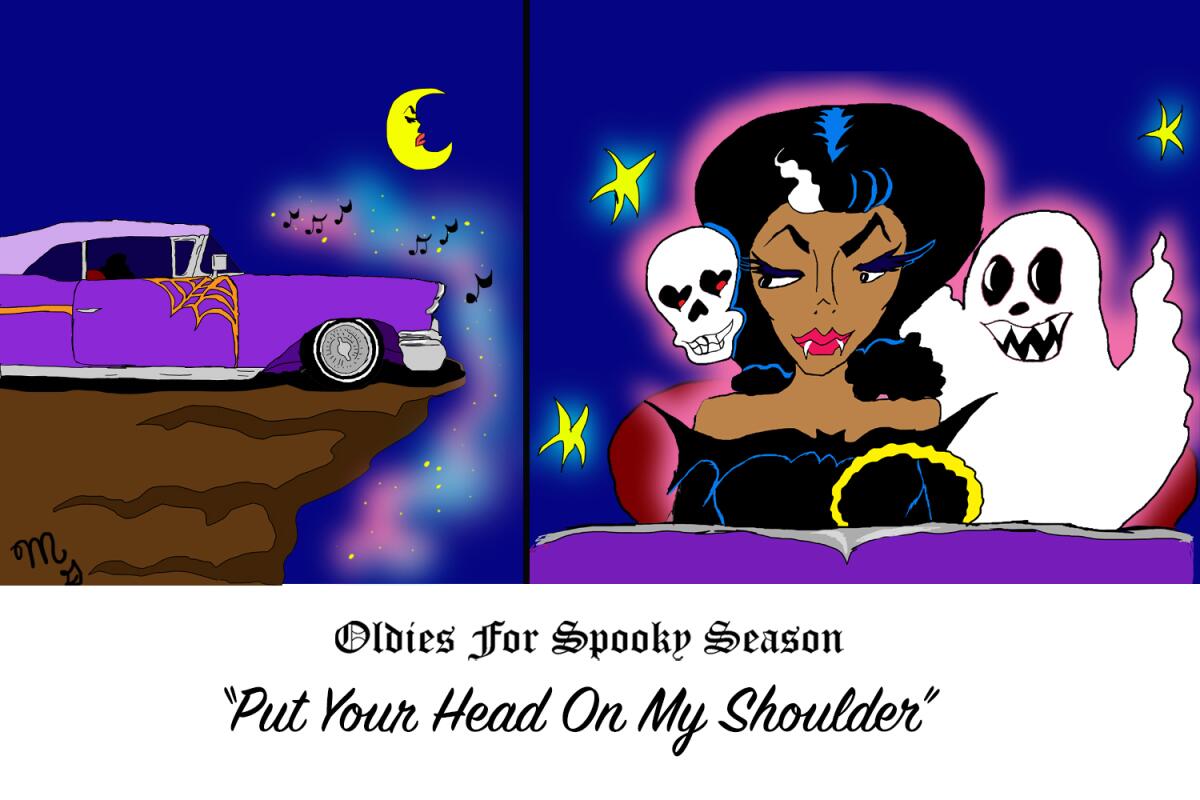Latinx Files: The six Latinx ‘geniuses’

- Share via
On Tuesday, the John D. and Catherine T. MacArthur Foundation announced the 25 recipients of the 2021 MacArthur Fellowship. This so-called genius grant is awarded to “individuals who have shown extraordinary originality and dedication in their creative pursuits and a marked capacity for self-direction.”
In addition to the prestige, each fellow receives a no-strings-attached grant of $625,000 over five years.
This year, six Latinxs were awarded the fellowship: writer and radio producer Daniel Alarcón; microbiologist Dr. Victor J. Torres; filmmakers Cristina Ibarra and Alex Rivera; painter and sculptor Daniel Lind-Ramos; and historian Monica Muñoz Martinez.
“I’m stunned,” Rivera told The Times. “Over the moon and grateful. I’m also processing the scale of the challenges we face in our field.”
Rivera noted that the financial support he and Ibarra would get — the two are married (they are the first husband and wife to be named fellows in the same year) and are frequent collaborators — was critical.
It’s also, as Rivera put it, “less than half the budget of a one-hour episode of ‘Narcos.’”
“This fellowship will allow me to continue producing Latino cinema that is visually elevated and socially grounded. But there’s a massive machine already in place that produces representations of our community that are often misguided, sometimes hateful. To compete with that, I’ll have to build on this moment. Inspired by the recent achievements of politically committed, visionary filmmakers like Ava DuVernay, I know another cinema is possible. There’s no time to waste.”
While Rivera looks to the future (fitting given that some of his films, like 2008’s “Sleep Dealer,” which I’ve briefly written about in this space, are science fiction), Ibarra took time to acknowledge their predecessors.
“I can’t help but think about the story of our careers and our cinematic roots in socially driven documentaries and narratives,” she said.
“It wasn’t until I was exposed to the films of pioneer Chicana/o filmmakers like Lourdes Portillo, Nancy de los Santos, Hector Galán and Luis Valdez that I even realized we can make films. Today, as we look forward, I also want to think about the groundbreaking voices that opened up a space for us to keep pushing, updating and inventing our own visual language.”
With the exception of Torres, whose work focuses on better understanding drug-resistant bacteria in order to develop potential lifesaving therapies, the rest of the Latinx MacArthur fellows have something in common: They’re in the business of telling our people’s stories.
Alarcón is co-founder of “Radio Ambulante” and editorial director of “El Hilo,” two Spanish-language podcasts that explore the ties shared among Spanish speakers throughout the Americas.
Lind-Ramos uses found objects to create works of art that reflect his Afro-Puerto Rican roots.
“My practice is like an exercise of memory,” said Lind-Ramos. “Objects linked to my personal, communal and regional Afro-Caribbean experience give me the opportunity to connect to that memory and to experiment with the formal and symbolic possibilities of its materiality.”
The Latinx experience chronicled
Get the Latinx Files newsletter for stories that capture the multitudes within our communities.
You may occasionally receive promotional content from the Los Angeles Times.
And then there’s Muñoz Martinez, whose projects center on telling the forgotten history of violence (much of it state-sanctioned) perpetrated against Mexicans and Mexican Americans along the Texas borderlands. If her work sounds awfully familiar, that’s because I frequently reference it in this newsletter. I did it last week when writing about the Border Patrol’s cruelty toward Haitian refugees near Del Rio, Texas.
“Historians have a responsibility to the profession to contribute new findings and advance knowledge,” said Muñoz Martinez. “But historians also have a responsibility to society more broadly to make sure that people have access to that knowledge. People have a right to learn truthful accounts of history in schools, museums, the news and popular culture, even when those histories are troubling.”
I love finding out that Latinxs have been named MacArthur fellows. It fills me with pride knowing that some of us are not only imagining cosas chingonas but actually doing them.
To learn more about the MacArthur fellows and their work, you can go here.
Our daily news podcast
If you’re a fan of this newsletter, you’ll probably love our new daily podcast, “The Times,” hosted by columnist Gustavo Arellano, along with reporters from across our newsroom. Every weekday, it takes you beyond the headlines. Subscribe on Apple Podcasts and follow on Spotify.
‘This isn’t that hard’
On Sunday night, MSNBC host Alicia Menendez concluded the second hour of her show, “American Voices With Alicia Menendez,” with a segment on the recent U.S. Government Accountability Office report that found that Latinxs are severely underrepresented in the media industry.
Menendez, who also hosts the podcast “Latina to Latina,” wrapped up the segment by offering her own commentary on the issue.
“In this conversation about more Latino representation, here’s the thing — this isn’t that hard. You’ve just gotta decide that it’s a priority — even after Hispanic Heritage Month is over.”
She’s not wrong. Getting more Latinxs in media — whether it be film and television, journalism or the publishing industry — isn’t that hard. You just have to do it. It doesn’t take some genius to figure this out. Though if asked, I’m sure several of the distinguished folks in the section above would be more than up to the task.
Jaime Jarrín is retiring. Despídanlo con un beso.
When it comes to Dodger legends, Vin is Vin, but Jaime is Jaime.
Jaime Jarrín, the Spanish radio voice of Los Doyers de Nuestra Señora la Reina de los Ángeles de Porciúncula for more than six decades, will be retiring after the 2022 season. Dodgers beat reporter Jorge Castillo spoke with several fans about what Jarrín meant to them.
From his story:
For Rolando Guiterrez, who was raised in the San Gabriel Valley, Jarrín’s voice, his sound, made him distinctive. For Richard Mejía, who grew up with Honduran parents in East Los Angeles, Jarrin’s Los Defensores commercials on Univisión and Telemundo added to his legend. For Victor Corona, Jarrín made it so easy to pick up the game listening with his grandfather in Mexicali during summer vacations.
And since we’re on the subject of baseball, the Los Angeles Times will be hosting a live event at the famed Ricardo Montalbán Theatre on Monday to celebrate the finale of “Fernandomania @ 40,” our documentary series on Fernando Valenzuela’s magical 1981 season.
ESPN Deportes is the sponsor for this event.
For tickets (they’re $30) and more information, go here.
Consider subscribing to the Los Angeles Times
Your support helps us deliver the news that matters most. Become a subscriber.
Things we read this week that we think you should read
— Boston Globe Opinion columnist Marcela García isn’t letting Democrats off the hook when it comes to immigration reform after the Senate parliamentarian rejected the party’s Plan A and Plan B in using the reconciliation bill to give Dreamers and other immigrants a pathway to citizenship.
— Times columnist Jean Guerrero wrote about the betrayal felt by California farmworkers after they helped Gov. Gavin Newsom keep his job. Newsom vetoed a bill that would have allowed farmworkers to vote by mail in union elections days after winning the recent recall election.
— Longtime border and immigration reporter Melissa del Bosque has launched the newsletter “The Border Chronicle.” This week, Del Bosque delved into the role that right-wing media played in manufacturing a crisis in Del Rio, Texas.
— The Latin Grammy Awards nominees have been announced. Music reporter Suzy Exposito breaks it down for you.
— Staff writer Daniel Hernandez has this take on how and why Hispanic Heritage Month has become a meme on social media.
And now for something completely different ....

Melanie Gonzalez is a Chicana illustrator and writer born and raised in Los Angeles. Aside from drawing, she enjoys crafting, estate sales and is always on the hunt for the best burrito.
“As we move into October, I wanted to welcome in the thinning of the veil between the spirit world and the living,” Gonzalez said. “With our legends and traditions, the Latinx community has contributed a lot to spooky culture. I also wanted to give a nod to a true Angeleno pastime, which is cruising to lowrider oldies.”
Are you a Latinx artist? We want your help telling our stories. Send us your pitches for illustrations, comics, GIFs and more! Email our art director at martina.ibanezbaldor@latimes.com.
The Latinx experience chronicled
Get the Latinx Files newsletter for stories that capture the multitudes within our communities.
You may occasionally receive promotional content from the Los Angeles Times.




